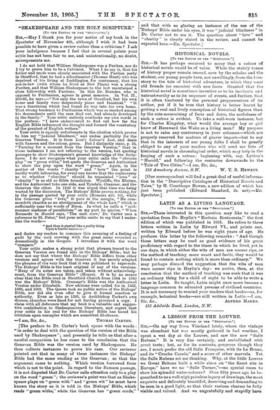0 131TAVEISPEARE AND THE HOLY SCRIPTURE."
(To THE EDITOR OF THE "Srearsron."
Si,—May I thank you for your notice of my book in the 'Spectator of November 4th, although I wish it had been possible to have given a review rather than a criticism ? I ask your indulgence because I feel that in several points your critic has not been fair to me, and unintentionally, no doubt, misrepresents me.
I do not hold that William Shakespeare was a Puritan, nor do I try to prove him to be a Calvinist. What I do say is, that his father and uncle were closely associated with the Puritan party in Stratford, that he had a schoolmaster (Thomas Hunt) who was deprived of his living at Luddington for contumacy, that his son-in-law (with whom he lived at New Place) was a strong Puritan, and that William Shakespeare to the last maintained a close fellowship with Puritans. In this Dr. Brandes, who is opposed to Puritanism, agrees in great measure. In Vol. IL, 390-91, he says :—" Not only the town of Stratford, but his own home and family were desperately pious and fanatical." "It was a fanaticism which had found its way into his own home. That strong tendency to Puritanism which was so marked among his descendants until the race died out, had already developed in the family." Your critic entirely overlooks my own words in the preface: "I have endeavoured to find out how far the English Bible influenced the thought and formed the vocabulary of the greatest of English writers.'
Your critic is equally unfortunate in the citation which proves
to him my "judicial blindness," and undue partiality for the Genevan Version. It is from Love's Labour's Lost, and deals with Samson and the colour, green. But I distinctly state, p. 16, "Turning for a moment from the Genevan Version," that in these instances I am not referring to the version, but quoting passages to show Shakespeare's general knowledge of the Scrip- tures. I do not recognise what your critic calls the "obvious play" on "green withs," but quote the Genevan and Authorised to show the play upon the word "green." Again, in the matter of the words " charity " and " love " the point is hardly worth labouring, for every one knows that the controversy as to whether " cbaritas " should be translated " love " or "charity" is as old as Bible translation. Wycliffe, the Rheims, and the Authorised take one side, and Tyndale, Cranmer, and the Genevan the other. In 1542 it was urged that time was being wasted by the discussion. The Bishops' Bible proves nothing, for in the passage quoted by your critic (Romans xiii. 10), while the Genevan gives " love,' it puts in the margin, "He com- mendeth charitie as an abridgement of the whole Law," which is sufficiently near the words of Biron. In what he calls a " mid- summer madness of parallelism" on my part he quotes, " When Bernardo in Hamlet says, 'The cock crew,' Dr. Carter sees a reference to St. Peter," but your critic omits to say that I under- line the words— ...And then it started like agnilty thing Upon a fearful summate,'.
and desire my readers to compare this arousing of a feeling of guilt by the cock crowing with the great scene recorded so dramatically in the Gospels. I introduce it with the word "compare." Your critic makes a strong point that phrases traced to the Genevan Version are found also in the Bishops' Bible; but he does not say that where the Bishops'. Bible differs from other versions and agrees with the Genevan it has merely adapted the phrases of the very book that it was published to supersede. The Bishops' Bible is the least original of any of the versions. "Many of its notes are taken, and taken without acknowledg- ment, from the Genevan Bible" (Hoare). It is by no means clear that the Bible read in Stratford Church from 1564 to 1580 was the Bishops' Bible. Cranmer's Bible was the Authorised Version under Elizabeth. New editions were called for in 1562, 1566, and 1568. The Queen took no public notice of the Bishops' Bible, nor did she even offer to give it formal sanction or authority. Even as late as 1585, in Archbishop Parker's own diocese, churches were fined for not having procured a copy. I claim with all deference that my book is a valuable and sugges- tive contribution to Shakespearean literature, and regret that your critic in his zeal for the Bishops' Bible has based his criticism upon examples which are somewhat ill-chosen.
[The preface to Dr. Carter's book opens with the words : "in order to deal with the question of the version of the Bible used by Shakespeare" ; and presently he tells us that after a careful comparison he has come to the conclusion that the Genevan Bible was the version used by Shakespeare. He then collects instances to prove his case. Our reviewer pointed out that in many of these instances the Bishops' Bible had the same reading as the Genevan ; so that the argument came to nothing. Which version borrowed from which is not to the point. In regard to the Samson passage, it is not disputed that Dr. Carter calls attention only to a play on the word "green"; the reviewer's point was that as Shake- speare playa on "green with" and "green wit" he must have known the story as it is told in the Bishops' Bible, which reads.." green wittu3," .while the Genevan has "green cords," and that with so glaring an instance of the use of the 'Bishops' Bible under his eyes, it was "judicial blindness" in Dr. Carter not to see it. The question about " love " and " charity " is clearly stated in the review, and cannot be repeated here.—En. Spectator.]


































































 Previous page
Previous page